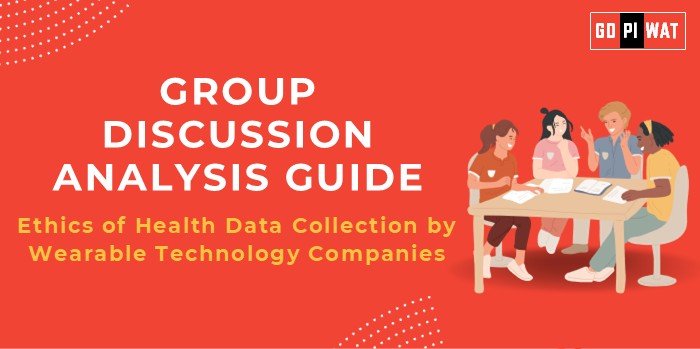📋 Group Discussion Analysis Guide: Ethics of Health Data Collection by Wearable Technology Companies
🌐 Introduction to the Topic
Opening Context: “As wearable technology becomes a staple in modern health monitoring, the ethical implications of health data collection and usage by tech companies are increasingly under scrutiny. These issues challenge the intersection of innovation and privacy in the digital age.”
Topic Background: The advent of wearable devices, like fitness trackers and smartwatches, has revolutionized personal health management. However, concerns around the collection, storage, and commercialization of sensitive health data are rising. Recent incidents of data breaches and misuse emphasize the urgency of addressing ethical challenges.
📊 Quick Facts and Key Statistics
- Wearable Devices Market: Projected to reach $114 billion by 2028 (Source: Statista, 2024).
- Data Breach Incidents: 30% of health-related data breaches in 2023 involved wearable technology companies.
- User Base: Over 1 billion wearable devices globally in use by 2024.
- Legal Frameworks: Only 35% of countries have comprehensive laws on health data protection.
👥 Stakeholders and Their Roles
- Wearable Tech Companies: Develop devices and platforms, collect user data.
- Consumers: Provide data in exchange for health insights, vulnerable to misuse.
- Governments: Regulate data privacy and enforce compliance.
- Healthcare Providers: Use wearable data for patient management, facing ethical dilemmas.
- Data Protection Advocacy Groups: Push for stricter privacy norms and transparency.
📈 Achievements and Challenges
Achievements
- Improved Health Outcomes: Real-time monitoring aids in early diagnosis and chronic disease management.
- Research Advancements: Aggregated health data contributes to breakthroughs in medical research.
- Personalized Health Insights: Wearables enable tailored wellness programs.
Challenges
- Data Privacy: Potential misuse of sensitive data, exemplified by incidents like Cambridge Analytica-style profiling.
- Regulatory Gaps: Uneven legal protection globally.
- Consumer Awareness: Many users lack understanding of data-sharing agreements.
Global Comparisons
- EU GDPR: Enforces stringent data protection for wearable companies.
- US: HIPAA safeguards health data but has limitations for wearables not linked to healthcare providers.
Case Study: Fitbit’s collaboration with researchers raised concerns about consent in aggregated data usage.
📋 Structured Arguments for Discussion
- Supporting Stance: “Wearables offer invaluable health insights, driving preventive care and reducing medical costs.”
- Opposing Stance: “The lack of transparency in data handling by wearable companies poses a significant privacy threat.”
- Balanced Perspective: “While wearables benefit health management, robust regulations are essential to safeguard user privacy.”
💡 Effective Discussion Approaches
Opening Approaches
- Statistical Impact: “Over a billion wearable devices are now active, yet 30% of health data breaches in 2023 involved these devices.”
- Ethical Query: “Can the benefits of wearable health data ever outweigh privacy risks?”
Counter-Argument Handling
- Acknowledge consumer benefits but emphasize GDPR’s success in regulating data collection.
📊 Strategic Analysis of Strengths and Weaknesses
- Strengths: Improved health tracking, medical research aid.
- Weaknesses: Data misuse risks, lack of global regulations.
- Opportunities: Integration with AI for disease prediction, global health initiatives.
- Threats: Cybersecurity breaches, user trust erosion.
🎓 Connecting with B-School Applications
Real-World Applications
- Role of ethical data practices in business sustainability and innovation.
Sample Interview Questions
- “How can wearable tech companies balance innovation with user privacy?”
- “What role do government policies play in regulating wearable technology?”
Insights for Students
- Understanding ethical dilemmas in data management.
- Researching privacy laws and frameworks for projects.


